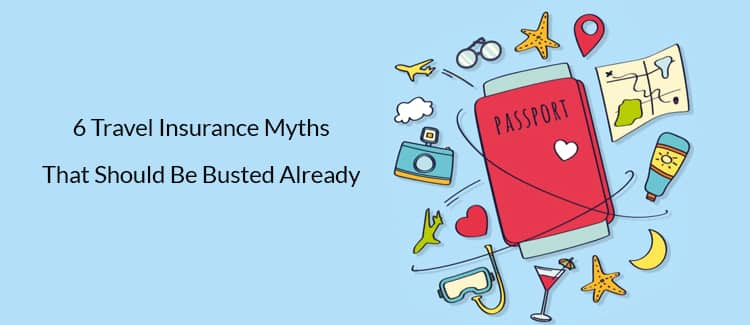
When it comes to planning a trip, travel insurance is often an afterthought for many travelers. Despite its importance, several misconceptions about travel insurance persist, leading to confusion and hesitation. Whether it’s a weekend getaway or an international adventure, understanding the truth behind these myths is essential for making an informed decision. Travel insurance is not only about safeguarding your trip but also about protecting your health, belongings, and peace of mind. Here are some common travel insurance myths busted, along with the crucial information you need to know before you buy.
Myth 1: I Don’t Need Travel Insurance for Domestic Travel
One of the most pervasive myths about travel insurance is that it’s unnecessary for domestic trips. Many travelers assume that because they are not venturing abroad, they don’t need the protection offered by a travel insurance policy. However, this assumption can be a costly mistake.
Emergencies can strike anywhere, whether you’re flying across the country or road-tripping through your home state. From medical issues to flight cancellations or lost luggage, travel insurance can provide a safety net that domestic health insurance might not cover, especially when you’re away from your usual provider. Policies can offer trip cancellation, medical evacuation, and baggage protection — all of which are valuable, regardless of whether you’re traveling abroad or within your own country.
Even if your domestic travel doesn’t seem risky, unexpected disruptions can occur. A policy that includes coverage for delays, cancellations, or mishaps is a smart choice to ensure you’re financially protected.
Myth 2: My Credit Card Covers All My Travel Insurance Needs
Another misconception is that credit card benefits offer sufficient travel insurance. While some credit cards do provide certain protections for travel-related issues, they typically only cover a limited set of circumstances. These benefits are often supplementary, meaning they may not cover everything you need for a comprehensive travel insurance plan.
For instance, many credit card travel insurance plans only cover trip cancellations in the case of severe illness or death, and may not include medical emergencies, lost baggage, or missed connections. Furthermore, credit card coverage may come with restrictions, such as needing to book the trip with that specific card, or not covering certain high-risk activities like adventure sports or cruises.
Relying solely on a credit card’s travel insurance can leave significant gaps in coverage. For broader protection, it’s wise to purchase a standalone travel insurance policy that provides more extensive coverage tailored to your trip’s needs.
Myth 3: Travel Insurance Is Too Expensive
Many travelers avoid purchasing travel insurance due to the belief that it’s too expensive. In reality, travel insurance is often quite affordable, especially when compared to the potential costs of medical emergencies, trip cancellations, or baggage loss. The price of a policy typically depends on factors such as your destination, the type of coverage you need, and the duration of your trip.
Basic coverage plans can be reasonably priced, particularly if you choose a package that suits your specific requirements. Additionally, there are options to upgrade to more comprehensive policies if you want additional benefits, such as adventure sports coverage or trip interruption protection. Rather than seeing it as an unnecessary expense, consider travel insurance an investment that can save you from much higher unforeseen costs.
If you are on a budget, compare different travel insurance providers to find a plan that fits your needs and offers the best value for money. It’s far more cost-effective to pay a small amount for coverage upfront than to risk facing large, unexpected bills in the event of an emergency.
Myth 4: I Don’t Need Travel Insurance If I’m Healthy
It’s a common misconception that healthy travelers don’t need travel insurance. While it’s true that you may be in good health, unforeseen health issues or accidents can still occur during travel. Health conditions can arise unexpectedly, and illnesses or injuries can happen at any point, regardless of age or fitness level.
For example, food poisoning, a sprained ankle, or a sudden medical emergency abroad can result in significant medical bills, especially in countries with high healthcare costs. Even if you’re in good shape, you could be at risk of contracting diseases or sustaining an injury while traveling, particularly in remote areas or places with unfamiliar risks.
A comprehensive travel insurance policy that covers medical emergencies, hospitalization, and evacuation is a safety net that provides peace of mind, no matter how healthy you may be.
Myth 5: Travel Insurance Covers Everything
While travel insurance provides significant coverage, it doesn’t cover every possible situation. It’s important to understand the limits of a policy and read the fine print. Many travel insurance policies exclude coverage for pre-existing medical conditions, certain high-risk activities like extreme sports, or specific circumstances like traveling to areas with known political instability.
It’s also worth noting that travel insurance policies typically have coverage limits. For example, medical coverage might only cover up to a certain amount, and expenses exceeding that limit would be your responsibility. Similarly, you may need to meet a deductible before receiving compensation for certain claims.
Before purchasing, ensure you understand what is and isn’t covered. If you have specific concerns, such as a pre-existing medical condition or the desire to engage in adventurous activities, be sure to seek a policy that addresses those needs.
Myth 6: I Can Buy Travel Insurance at Any Time Before I Depart
Many travelers believe they can purchase travel insurance anytime before their trip. However, to fully benefit from certain protections, such as trip cancellation and pre-existing medical condition coverage, it’s best to buy your insurance as soon as you book your trip.
Travel insurance often needs to be purchased within a certain time frame, typically 14-21 days after making the initial trip deposit, to be eligible for specific benefits. This includes coverage for cancellation due to illness or other unforeseen events. Purchasing insurance well in advance can also give you more options to choose from and ensure you’re covered for everything you need.
Myth 7: Travel Insurance Will Pay for Everything
While travel insurance can reimburse you for many costs, it doesn’t cover every scenario. For example, missed connections or flight delays are often only reimbursed if they meet certain criteria, such as delays of a certain length or caused by specific events. Policies typically don’t cover the full cost of elective activities or non-refundable expenses if you cancel without a covered reason.
It’s essential to understand the specific exclusions and limitations of your travel insurance policy so that you can plan accordingly. Don’t assume that the insurance will pay for every inconvenience or mishap. Knowing exactly what’s covered can help you avoid disappointment in the event of a claim.
Conclusion
Travel insurance is a vital component of any travel plan, offering peace of mind and financial protection against the unexpected. By debunking common myths surrounding travel insurance, travelers can make informed decisions that enhance their overall travel experience. Whether it’s covering medical emergencies, trip cancellations, or lost baggage, the right travel insurance provides crucial support when things go awry.
Don’t let myths cloud your judgment when selecting travel insurance. By understanding what it truly offers and recognizing the limitations of coverage, you can ensure that your journey is safe, secure, and free from unnecessary financial strain.









